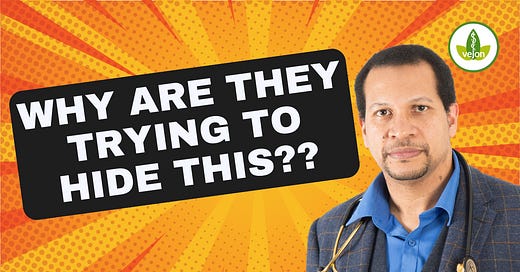In the world of public health, timing is everything. Recent events surrounding Moderna’s RSV mRNA vaccine trials have reminded me just how critical it is to pay attention, not just to what’s being said, but also to what’s conspicuously absent from the headlines.
You might not have heard, but the FDA recently halted trials of Moderna’s RSV vaccine for children. This decision came after troubling data showed that vaccinated infants were not only failing to gain protection from RSV but were also experiencing worse outcomes when exposed to the virus. Yet, for such a significant development, there was an eerie silence from mainstream news outlets.
Why is that? And what does it tell us about the way critical health information is shared, or obscured?
Purchase on Amazon here >
A Vaccine Trial Halts, and Nobody Notices
On December 13, 2024, the FDA flagged significant safety concerns in Moderna’s pediatric RSV vaccine trial. The vaccine, an mRNA-based candidate, appeared to exacerbate RSV infections rather than mitigate them. This is a significant finding, with implications for mRNA vaccine technology as a whole.
But instead of sparking widespread discussion, this revelation seemed buried beneath other stories. That same day, headlines focused on Stephen Bartlett’s podcast, accused of spreading "health misinformation." The timing is interesting, to say the least.
Read BBC Article here >
When a major vaccine trial encounters a safety issue, the public deserves to know. This isn’t about spreading fear—it’s about transparency. If we can’t openly address challenges, how can we hope to improve public trust in medical advancements?
What We Know About the RSV Vaccine Trials
The halted trials revealed a troubling pattern: children vaccinated with the RSV mRNA shot were more likely to develop severe respiratory illnesses when exposed to RSV or other respiratory viruses. This finding aligns with what we’ve seen in some mRNA studies—a potential suppression or alteration of the immune response.
In recent clinical trials, two experimental RSV vaccines for babies may not only have failed to protect them, but actually made some of them sicker when they got RSV or another respiratory virus. The findings, publicly discussed in detail for the first time yesterday, have profoundly unsettled many RSV scientists, who recall similar problems with a vaccine trial decades ago.
Scienceinsider - 13 December, 2024 (Jon Cohen)
Read full Article here >
In simple terms, mRNA vaccines work by instructing cells to produce specific proteins (like the spike protein in COVID-19 vaccines) to train the immune system. But this approach requires bypassing natural cellular defenses, like RIG-1 and MDA5, which normally guard against foreign RNA. While this is necessary for the vaccine to function, it can also disrupt the body’s natural immune balance.
The Broader Implications of Immune Disruption
This case isn’t just about RSV. It raises broader questions about how mRNA technology interacts with the immune system, especially in vulnerable populations like children.
The principle behind mRNA vaccines is flexibility, scientists can quickly adapt the formula to target emerging threats. But this adaptability doesn’t erase the need for rigorous, long-term safety studies. What happens when repeated exposure to mRNA technology alters how the immune system responds to not just one virus, but many?
This isn’t just theoretical. A Cleveland Clinic study showed that individuals who received multiple COVID-19 booster doses were at increased risk of infection, not severe disease, but infection itself. These findings underline the complexity of immune responses and the importance of understanding the trade-offs of any medical intervention.
Shrestha, Nabin K., et al. "Effectiveness of the coronavirus disease 2019 bivalent vaccine." Open Forum Infectious Diseases. Vol. 10. No. 6. US: Oxford University Press, 2023.
Why Silence Is Dangerous
When significant news like this is overshadowed or ignored, it erodes public trust. People are left feeling like they’re being kept in the dark, and that perception breeds suspicion.
As a physician, I’ve always believed in empowering people with knowledge. That means sharing the successes of vaccines, but also being upfront about the challenges and limitations. If we gloss over the difficult parts, we risk losing the very trust that public health campaigns depend on.
What Can We Do?
Demand Transparency: Public health organizations must prioritize openness about trial results, both positive and negative.
Encourage Balanced Reporting: Media outlets should avoid sensationalizing one story to the detriment of others, particularly when public health is at stake.
Stay Curious: Don’t just accept the headlines at face value. Ask yourself, “What’s missing? What else is happening right now?”
A Call to Action
The challenges surrounding the RSV vaccine trial highlight why we need vigilance and accountability in the development of new medical technologies. These issues aren’t insurmountable, but they require us to face them head-on rather than sweeping them under the rug.
As I reflect on this situation, my commitment to transparency and education grows stronger. Together, we can demand better communication, foster trust, and ensure that science serves the people it’s meant to protect.
Please support my research efforts by subscribing to Vejon Health Substack. Your support allows me to continue bringing you my insights in a timely and effective way.















Share this post